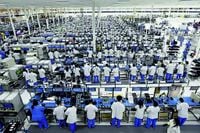Foreign companies operating in China are grappling with a significant increase in tariffs that are squeezing their operations between the conflicting trade policies of Washington and Beijing. These companies are now facing tariffs as high as 125% on imported raw materials and 145% on exported finished products, a situation that has sparked serious concern among business leaders and economists alike.
As reported by the Financial Times, the tariffs imposed by the Trump administration have created a challenging environment for international firms, particularly major American companies such as Apple and Tesla, which rely heavily on China for manufacturing. These firms import raw materials from the United States to assemble products that are then exported back to the U.S., effectively doubling their tariff burden.
“Foreign companies are really being squeezed in the Chinese market,” said Heiwai Tang, director of the Asia Global Institute at the University of Hong Kong. “When they import, they pay Chinese tariffs. When they export back to the U.S., they pay American tariffs. They are taking a double hit.”
Official data reveals that foreign-invested enterprises accounted for nearly one-third of China’s total trade last year, with exports valued at $980 billion and imports at $820 billion, according to the General Administration of Customs in China and calculations by the Financial Times. This trade dynamic underscores the critical role that foreign companies play in China’s economy, despite a gradual decline in their share of total trade due to the country’s push for greater industrial self-sufficiency.
In 2008, foreign-invested companies represented 55% of China’s total trade, but that figure has dropped significantly over the years. In 2022, they accounted for only 29.6% of the trade value, a stark contrast to their previous dominance. However, they still represented just 16% of China’s trade surplus last year, as their export volumes were offset by a larger share of imports.
Michael Hart, president of the American Chamber of Commerce, pointed out that many foreign companies operating in China are not American but rely on American products, and thus they too are adversely affected by these tariffs. “There are quite a few foreign companies operating in China that are not American, but they rely on American products, and so they are hit as well,” Hart stated.
In an effort to mitigate the impact of these tariffs, the Chinese Ministry of Commerce is considering tariff exemptions for certain sectors. This could provide some relief for companies that import components and raw materials for goods intended for re-export, a practice known as “processing trade.”
Some larger American manufacturers, including smartphone and electronics producers, have also managed to secure temporary exemptions from the tariffs imposed by the Trump administration. However, many foreign companies, particularly smaller manufacturers, may find it prohibitively expensive to export from China under the current tariff regime.
Jacob Rothman, CEO of Velong Enterprises, a China-based company that manufactures kitchenware and household products sold by American retailers like Walmart, described the challenges his company faces. “We are subjected to double tariffs for products made with materials imported from American suppliers,” Rothman explained. “Once when importing the material and again when exporting the finished products.”
This situation has raised alarms about the potential long-term effects on the Chinese economy, as both American and Chinese tariffs threaten to stifle trade and economic growth. The increase in American tariffs to 145% has prompted Beijing to retaliate, further complicating the trade landscape.
As the trade war escalates, the implications for foreign companies operating in China are profound. These businesses not only face increased costs but also uncertainty in their operations, which could lead to a reevaluation of their strategies in the region. The ongoing tariff disputes are a stark reminder of the complexities of global trade and the interconnectedness of economies.
While the Chinese government is exploring options to alleviate the burden on foreign companies, the path forward remains fraught with challenges. The evolving trade policies between the U.S. and China could reshape the landscape for international businesses, and many are left wondering how to navigate this increasingly difficult environment.
In conclusion, as foreign companies continue to face the brunt of escalating tariffs, the need for strategic adjustments and potential policy interventions becomes ever more pressing. The ability of these companies to adapt will be crucial in determining their future in the Chinese market and beyond.




